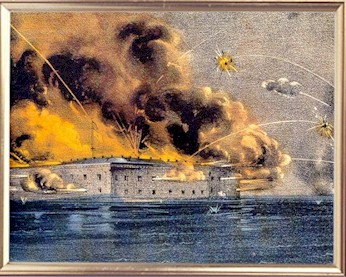Today is April 12, 2011. It is also exactly 150 years since a momentous day in the history of our nation. Exactly 150 years ago, on April 12, 1861, in Charleston, South Carolina, shots were fired on a small garrison of United States military personnel stationed on on island in the harbor called Fort Sumter.
Whether or not you consider this a great day of shame or pride, may be a matter of where you call home, but it cannot be denied as a defining moment in our history.
On that day began what we call the Civil War. Some call it the War Between The States. Others call it the War of Northern Aggression. Whatever you call it, the war that followed today's actions 150 years ago defined our country in the eyes of the world and in the eyes of history forever. That war gave rise to the country we know today as opposed to what had existed before. It also produced what Abraham Lincoln called “a new birth of freedom”.
We live in a democracy, where it is commonly understood that the majority makes the law. In the understanding of Lincoln, the future of democracy was at stake when those shots were fired. He understood that if one state, or eleven states or any number of states, felt they had the right to secede from the Union because they did not like the results of an election then what would ultimately occur in this country would be nothing short of anarchy.
Ironically, there was a great divide in public opinion at that time, among those in both the North and in the South. Many felt in the months prior to today that our great political tradition of compromise would stave off the possibility of actual war. Compromise had always been the bedrock of our nation and had allowed us to find our way as a nation through many contentious difficulties both before and since. Today, as political foes on both extremes fight to oppose compromise politically on the issues faced by the nation now, we find ourselves once again facing the difficulties of extremism.
It is radically important to understand where we come from as a people, in order to know where we are going. It is necessary that our children learn the lessons of the past in order to avoid mistakes in the future.
For this reason, we are proud to have offered school assembly programs for more than twenty years that have aided in educating our young about the great events in our past. The Living Abe Lincoln brings children a great opportunity to relive this epic moment as told through the eyes and understanding of one of the most important minds of the time, our sixteenth president. Frederick Douglass brings to life one of the great free African-American leaders of the Civil War era in order to illuminate the unique and important view of that time as seen by our African- American brethren. Either of these spellbinding school assemblies is a chance for students to sample moments of time from a seminal moment in our past through the sensibilities of those who were at the center of those events.
We have seen first hand the effect these programs can have. We have witnessed the emotions that are produced in even our very youngest as they relive great tragedy. We are proud to have played our part.
We hope that as we pass this great milestone in time, that you will play your part and continue to bring these important assembly programs to your schools in the years to come.
To quote from Mr. Lincoln,
“Fellow-citizens, we cannot escape history. We of this Congress and this administration, will be remembered in spite of ourselves. No personal significance, or insignificance, can spare one or another of us. The fiery trial through which we pass, will light us down, in honor or dishonor, to the latest generation. We say we are for the Union. The world will not forget that we say this. We know how to save the Union. The world knows we do know how to save it. We -- even we here -- hold the power, and bear the responsibility. In giving freedom to the slave, we assure freedom to the free -- honorable alike in what we give, and what we preserve. We shall nobly save, or meanly lose, the last best hope of earth. Other means may succeed; this could not fail. The way is plain, peaceful, generous, just -- a way which, if followed, the world will forever applaud, and God must forever bless.”







